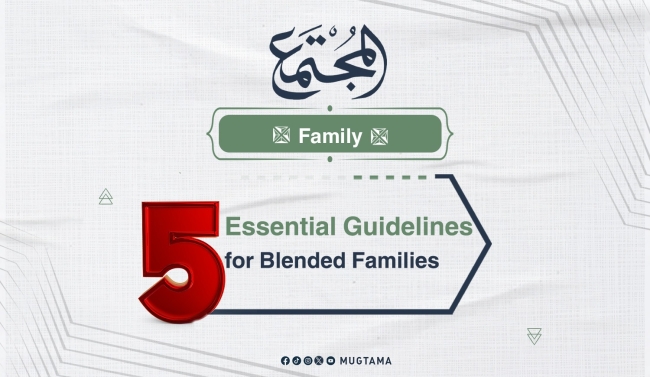A blended family is defined as a family composed of a couple who have children from previous marriages, and they are compelled to live together due to their union in the marital home.
In Western countries, blended families are quite common, but the phenomenon has started to make its way into several Arab countries as well, due to rising divorce rates. This situation imposes new and unfamiliar challenges on Arab and Muslim families that need to be addressed.
Children may feel confused and anxious, and they might not accept the new living arrangement with a stranger man or woman. This situation requires guidelines, etiquettes, and legal and ethical rules to govern these relationships.
Firstly: The daughter of a man’s wife is called his stepdaughter, and stepdaughters are forbidden to marry their stepfathers as long as the man has completed the marriage with their mother. It is forbidden for a man to marry the daughters of the woman he has consummated the marriage with; he is considered a mahram (non-marriageable relative) to all her daughters, before or after the marriage. Allah says, “Prohibited to you [for marriage] are your mothers...” up to “...and your stepdaughters under your guardianship [born] of your wives unto whom you have gone in.” (An-Nisa: 23) However, if he has not consummated the marriage with her, then he is not a mahram to her daughters; Allah says, “But if you have not gone in unto them, there is no sin upon you.” (An-Nisa: 23)
Islamic scholars state that raising a stepdaughter by her stepfather is recommended as a means of treating her mother kindly. He will be rewarded for this, especially if she is an orphan, and if she is not an orphan, he will be rewarded according to the effort he puts into raising her, following the Sharia guidelines.
We have a good example in the Prophet Muhammad (peace be upon him) who married women with children and took care of them. Umar ibn Abi Salama said: “I was a boy under the care of Allah's Messenger (ﷺ) and my hand used to go around the dish while I was eating. So Allah's Messenger (ﷺ) said to me, 'O boy! Mention the Name of Allah and eat with your right hand, and eat of the dish what is nearer to you.'” (Narrated by Al-Bukhari and Muslim)
Umar ibn Salamah was a stepson of the Prophet (peace be upon him). He was the son of Umm Salamah (may Allah be pleased with her) from her first husband, Abu Salamah, and was born in Abyssinia when his parents migrated there.
Secondly: On the other hand, raising the husband's children is an act of kindness and a form of love and mercy between spouses. The Prophet (peace be upon him) married Umm Salamah (may Allah be pleased with her) who set an excellent example in taking care of his daughters, Umm Kulthum and Fatimah (may Allah be pleased with them). The husband’s children need love and compassion, and someone to compensate for their mother’s absence, while seeking reward from Allah.
If the children are boys, the stepmother does not need to cover in front of them as they are her mahrams. Allah says, “And do not marry those [women] whom your fathers married, except what has already occurred.” (An-Nisa: 22) This ayah indicates that it is not permissible for a man to marry a woman whom his father or grandfather married, regardless of whether the grandfather is maternal or paternal, and whether he consummated the marriage with her or not.
Thirdly: It is necessary to avoid having the husband’s sons and the wife’s daughters live in the same house because they are not siblings. Mixing and seclusion between them is not permissible. The mother should provide a separate residence for her daughters close to her if they have reached the age of puberty, especially when the one responsible for their custody from the family is absent, according to Egypt's Dar Al-Ifta.
Fourthly: Psychologists and social experts recommend regular communication with the children, managing expectations, setting clear boundaries and rules, and establishing household guidelines that everyone adheres to. These guidelines should include respect for privacy and personal space for each individual and standards of discipline.
Fifthly: Feelings of jealousy and hostility may arise between the children of both spouses, regardless of their efforts to be fair. In such cases, each parent should spend individual quality time with their child, providing support and reassurance, and work towards finding common ground between the children.
-------------------------------------------------------------


